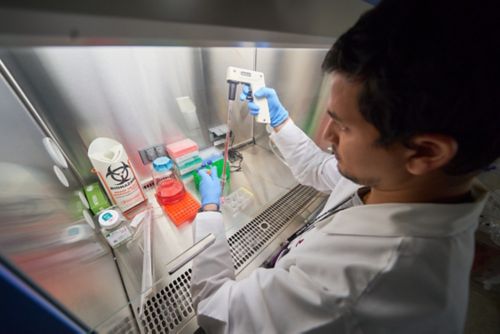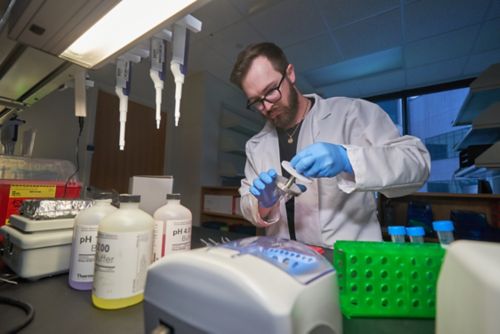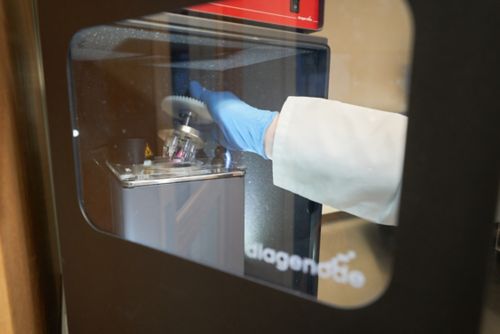St. Jude Family of Websites
Explore our cutting edge research, world-class patient care, career opportunities and more.
St. Jude Children's Research Hospital Home

- Fundraising
St. Jude Family of Websites
Explore our cutting edge research, world-class patient care, career opportunities and more.
St. Jude Children's Research Hospital Home

- Fundraising
Daniel Savic Lab
Uncovering gene regulatory alterations impacting chemotherapy resistance and treatment outcome in childhood leukemia
About the Savic Lab
A patient’s unique genetic makeup influences their response to pharmaceutical treatment. In some patients, this can lead to chemotherapy drug resistance that hinders effective treatment. It is imperative we understand the mechanisms of drug resistance as we work to treat pediatric patients with catastrophic disease. To advance our understanding, our laboratory focuses on gene regulation and how disruptions to this process impact treatment outcomes in children with acute lymphoblastic leukemia (ALL).

Our research summary
Gene regulation is driven by noncoding DNA sequences called cis-regulatory elements, such as enhancers and promoters, that recruit transcription factors, co-factors and other chromatin remodeling proteins for proper transcriptional control of genes across the genome. Genomic alterations to these cis-regulatory elements can affect drug sensitivity and treatment response in patients. The primary goal of our laboratory is to identify these alterations and to determine how they impact resistance to chemotherapeutic drugs or treatment outcomes in patients with acute lymphoblastic leukemia (ALL). Our research program encompasses three main areas: Investigating gene regulatory activity and networks in ALL, linking gene regulatory responses to chemotherapy resistance and evaluating the influence of noncoding genetic variants on ALL treatment.
Investigating gene regulatory activity and networks in ALL
To identify cis-regulatory elements impacting drug resistance, a comprehensive map of these elements and their gene targets is required. We utilize advanced genomic techniques, such as diverse chromatin profiling assays (ATAC-seq, CUT&TAG) to map active cis-regulatory elements and high-throughput chromosome conformation capture methods (Hi-C) to link long-range, three-dimensional interactions with genes they regulate in ALL cell models. This research led to the creation of the largest chromatin accessibility dataset in ALL to date, analyzing primary cells from over 150 patients across distinct molecular subtypes.

Linking gene regulatory responses to chemotherapy resistance
The exposure of ALL cells to chemotherapeutic agents elicits a gene regulatory response at cis-regulatory elements and their target genes. We employ complementary functional genomic techniques (e.g., ChIP-seq, ATAC-seq, RNA-seq) to measure these gene regulatory responses in ALL cell models after treatment with chemotherapeutic drugs. By mapping the gene regulatory response to common ALL chemotherapeutics, glucocorticoids (i.e., steroids) and L-asparaginase, and by combining these results with genomic data generated from drug-resistant or drug-sensitive primary ALL cells from patients, we identified important insights on mechanisms of resistance to these two antileukemic agents. Most notably, we recently discovered genomic interactions between glucocorticoid and canonical Wnt signaling pathways that affect ALL cell survival. Overall, our findings suggest that Wnt signaling antagonists could be beneficial for patients with glucocorticoid-resistant ALL.

Evaluating the influence of noncoding genetic variants on ALL treatment
Genetic variants, such as single nucleotide polymorphisms, are changes to DNA sequence nucleotides that are inherited or originate somatically within cells of an individual. We investigate how noncoding genetic variants at cis-regulatory elements impact drug resistance and treatment outcomes in ALL patients through alterations of gene regulation. To aid us in this investigation, we capitalize on genome-wide association studies (GWAS) that map genetic variants associated with diverse cellular and clinical phenotypes. Once genetic variants and trait associations are identified by GWAS, we employ state-of-the-art massively parallel reporter assays (MPRAs) to functionally validate and characterize thousands of noncoding variants in a highly multiplex manner. Most recently, this research culminated in the most extensive functional investigation to date of inherited noncoding genetic variants associated with antileukemic drug resistance, treatment response and/or relapse using MPRAs.
Translational Impact
Together, the ultimate objective of these areas of research focus is to advance precision medicine in childhood ALL through deeper understanding of genome function and the gene regulatory factors that influence chemotherapy outcomes. This knowledge will help develop more effective, personalized treatment strategies for pediatric ALL patients, as well as guide development of novel therapeutics that can bypass drug resistance mechanisms.
Selected Publications
Contact us
Daniel Savic, PhD
Associate Member
Department of Pharmacy and Pharmaceutical Sciences
MS 313, Room I5104
St. Jude Children's Research Hospital

Memphis, TN, 38105-3678 USA GET DIRECTIONS